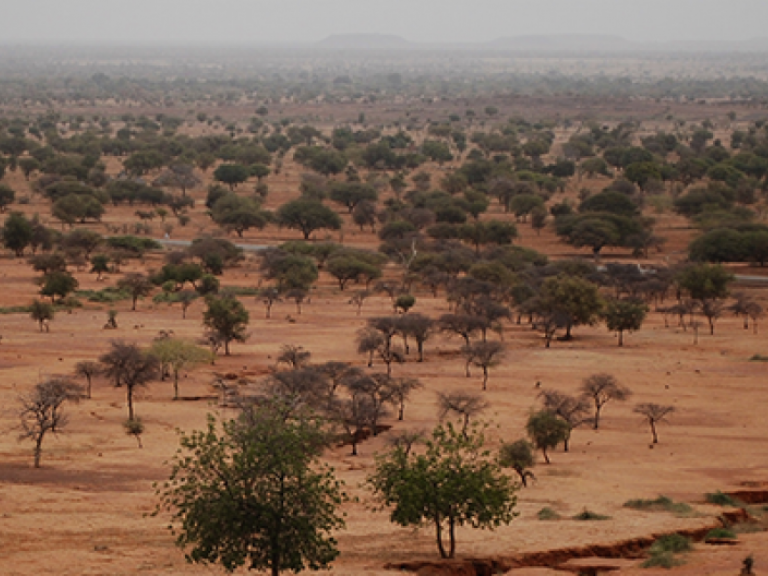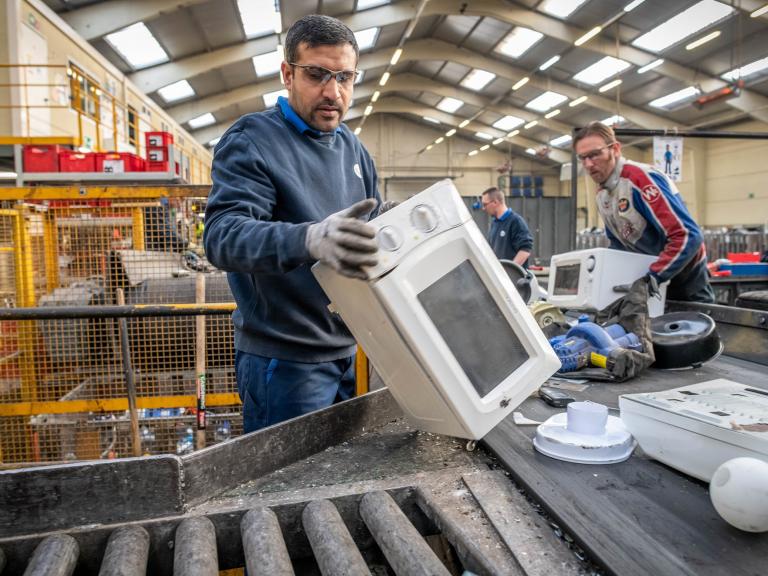-
Last updated on

Corals in the shade of a mangrove forest, in the "Coral Triangle" in Indonesia. © Shutterstock

The world's biodiversity is not doing well: the profusion of living organisms on Earth is visibly in decline. Scientists are talking about a sixth extinction wave, caused solely by human beings. During the last (fifth) extinction wave, the dinosaurs were among the species that perished.
The situation was serious even in 1992. This was why the international community signed up to a "Convention on Biological Diversity" (CBD) at the sustainability conference in Rio de Janeiro. Since then, Conferences of the Parties (COPs) have been held regularly, consisting of meetings with the 196 parties – the countries that signed the Convention – to discuss its follow-up.
In 2010, a plan known as the 20 Aichi target was formulated to help boost biodiversity by 2020. Unfortunately, biodiversity in 2020 is poorer than it has ever been.
This is why COP15 in 2020 was so important. The intention was to provide a new framework to protect our essential biodiversity once and for all. Its scope was to be similar to that of the Paris Agreement on climate change. But coronavirus threw a spanner in the works.
A preparatory meeting for COP15, on the screen right Ines Verleye representing Belgium. © Ines Verleye
Virtual does not work
Ines Verleye (FPS Environment) is head of the Belgian delegation monitoring the CBD within the EU and the UN. 'We've had to make do with virtual meetings,' she says, 'but that doesn't compare to an in-person conference. The very nature of a UN conference is that it must be possible for all countries to be represented equally. That just doesn't work with a virtual format, especially for the poorer countries.'
COP15 was initially postponed to October 2021. But that date too has been pushed back. A hybrid part of the meeting will take place in Kunming, China, from 11 to 15 October 2021, followed by the actual COP15 in person from 25 April to 8 May 2022.
'During the hybrid part, only the embassy staff are present,' explains Verleye. 'It has mainly procedural importance. For example, China can officially take over the presidency from Egypt and the budget can be approved. The finalisation of the post-2020 framework will not follow until May 2022.'

We need to give nature enough space so that she can give us what we need: oxygen, pure water, etc. © Shutterstock
Biodiversity protects when she’s protected
And that's really pity, because the world is in urgent need of an ambitious biodiversity plan. Verleye quotes from the COP11 in India (2012): 'Biodiversity protects when she's protected'. In other words, we need to give nature enough space so that she can give us what we need. Without biodiversity and its ecosystem services (pollination, clean air, fertile soil, water, etc.), humanity will not survive.
'All Sustainable Development Goals (SDGs) depend on biodiversity to succeed,' Verleye stresses. 'These cover food, water, health, but also partnerships. It's about much more than just SDG14 (oceans) and SDG15 (rural biodiversity).'
She cites the recent floods in Wallonia as an example: 'We even dig in rivers to build a city, because undeveloped land is seemingly worthless. But that land does have value! For agriculture, potable water, and climate adaptation. Soil filters the water.'

We consume and produce excessively. Photo: Shopping mall in Istanbul. © Shutterstock
Beyond Chocolate
According to Ines Verleye, land use is the main cause of the decline in biodiversity. 'We are using too much land, more than we should, partly because we waste a lot of food. What is more, the remaining pieces of nature are too fragmented. In addition, we consume and produce excessively. We're digging our own grave. There is too much emphasis on pure economic growth, when we should, in fact, uncouple our consumption and production from its harmful impact on nature. For example, by consuming locally produced goods so that less transport is needed. The Belgian initiatives Beyond Chocolate and Beyond Food are examples of how things can be done differently (Beyond Chocolate is a widely supported initiative to make Belgian chocolate sustainable, while with Beyond Food, Belgium also wants to make soya, palm oil, and coffee sustainable, ed.).'
Pension funds
Fortunately, people are gradually becoming more aware of the need for a change of direction, even outside the scientific and environmentalist communities. 'For a long time, biodiversity was only in the hands of the environment departments,' says Verleye. 'That's why the only Aichi target that was actually achieved was the one about conserving 17% of terrestrial and inland water. The environmental services could do that on their own. But to reduce harmful subsidies, for instance, you have to get the finance and economics departments on board.'
'Today, we are hearing alarm bells from the financial world, since many investments (in pension funds and elsewhere) are proving to be dependent on biodiversity. UN-Habitat also realises that biodiversity is essential for liveable cities. Many people have experienced during the pandemic how important green spaces are for our mental health. Companies are asking for clearly defined legislation on biodiversity. Yet short-term thinking remains stubbornly prevalent.'
Securing our own survival
Awareness is also growing that the biodiversity crisis and the climate crisis are inextricably linked and mutually reinforcing. 'It's no coincidence that nature is the theme of the upcoming climate summit in Glasgow (November 2021),' notes Verleye. ‘All solutions must be beneficial to both climate and biodiversity. There's no point in stopping the climate problems if we die of starvation afterwards.'
For that matter, biodiversity is in a worse state than the climate, according to Verleye. 'The tipping points will be reached sooner! It's no longer a question of respecting nature, but of securing our own survival. We need to protect nature, not for her, but for ourselves. If not, we are heading for a future with more pandemics, food crises, forest fires, floods, and so on.'
Ambitious Belgium
The Belgian biodiversity delegation has definitely understood this level of urgency. 'We speak with an uncompromising voice within the EU and often take the initiative, sometimes to the frustration of other Member States,' says Verleye. 'There is a great deal of expertise in our team of 25 to 30 people and we work together harmoniously. As we have to consult properly with the regions in advance, we are often thoroughly prepared than other countries.’
Also the Belgian government wants to send out a strong message. In September 2020, then Prime Minister Sophie Wilmès committed on behalf of our country to the Leaders' Pledge for Nature. Currently, over 80 countries have signed up to work towards an ambitious biodiversity plan at the level of heads of state and government. On the fringe of the UN General Assembly (22 September 2021), Prime Minister De Croo reiterated that biodiversity and climate are top priorities for our country.
Belgium also recently joined the High Ambition Coalition for Nature and People. This initiative at the level of environment ministers brings together over 60 countries that are fully committed to the 30x30 objective: to protect 30% of the land and 30% of the oceans by 2030. This 30x30 objective has also been included in the draft version of the post-2020 biodiversity framework that is currently on the table.
Post-2020 biodiversity framework
‘The post-2020 proposal looks fairly acceptable, but it could certainly be more ambitious,' says Verleye. 'For example, greater emphasis needs to be placed on consumption and production which respects the planet's limitations. And while protecting 30% of the Earth is not a bad thing, we need to be respectful of nature in the other 70% too. For Belgium, urban biodiversity is also a priority.'
The communication aspect is also important. 'The Aichi targets were formulated in a rather incomprehensible way,' notes Verleye. 'This now needs to be done differently, in a similar way to the SDGs: a limited number of clear objectives, along with a series of sub-objectives. All parties that want to play their part, from mayors to companies, must be given something that they can use right away. A clear link to the SDGs is crucial so that we can get the whole world on board.'
It will be a real challenge to finalise a post-2020 framework that all 196 parties can support. 'Because of the delay caused by the pandemic, we don't even know the positions of all the countries yet. And there are quite a few countries with firmly held positions, such as Brazil, whose current policies run contrary to all efforts to protect the environment.'
Resource mobilisation
Resource mobilisation is also becoming a sticking point. This is being monitored by Annemie Van der Avort, who represents the FPS Foreign Affairs in the Belgian biodiversity delegation. 'Resource mobilisation is about more than rich countries having to pass on extra money to poor countries. It is equally about the effective use of existing resources and about mainstreaming,' explains Van der Avort. 'Mainstreaming means that other sectors such as agriculture, industry, infrastructure, and transport also give consideration to biodiversity. It's also essential that harmful subsidies are reduced and that countries are able to mobilise their own resources (domestic resource mobilisation). There is also a need for technology transfer and scientific cooperation.'
'Public money can only cover 10% of the costs,' adds Verleye. 'But the private sector can only contribute if there is a clearly defined legislative framework.'
In any case, there are still quite a few virtual meetings on the agenda before the COP15 can finally (hopefully) take place physically next year. Belgium will stand firm by its commitment to achieve an ambitious and vital biodiversity policy. Our FPS can also play its part, for example through the various embassies involved.
More on Planet

Belgium helps build the Great Green Wall
Belgium has made a commitment to the 'Great Green Wall': an ambitious initiative aimed at restoring 100 million hectares of land...

The Great Green Wall: a wall that unites
Under the ‘Great Green Wall’ initiative, 20 million hectares of land have so far been restored. The 11 Sahel countries involved,...

Belgium, on its way towards a circular economy
Belgium ranks among the top 10 largest contributors of the UN Environment Programme (UNEP), the leading global environmental aut...
